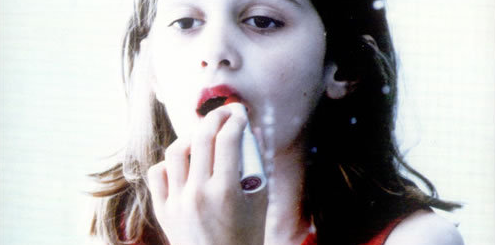Lady of the Flowers by Placebo Lyrics Meaning – Unraveling a Tale of Enigmatic Allure and Harsh Reality
Lyrics
I apologize
He likes your attitude
He tries it on for size
He spends the afternoon
Between your thighs
How’s that for gratitude
I apologize
It seemed to last for hours
It seemed to last for days
This lady of the flowers
And her hypnotic gaze
‘Scuse me
I apologize
She’s got vacuum cleaner eyes
That Sucks You In
She’s got magazines
Filled with pear pies
‘Scuse me
I apologize
It seemed to last for hours
It seemed to last for days
This lady of the flowers
And her hypnotic gaze
She wears her tears on her blouse
Confused and racked with self-doubt
She stole the keys to my house
And then she locked herself out
‘Scuse me
I apologize
He likes your attitude
He tries it on for size
He spends the afternoon
Between your thighs
How’s that for gratitude
I apologize
It seemed to last for hours
It seemed to last for days
This lady of the flowers
Her electronic haze
She wears her tears on her blouse
Confused and racked with self doubt
She stole the keys to my house
And then she locked herself out
She stole the keys to my house
And then she locked herself out
She lays me down
She lays me
Placebo’s ‘Lady of the Flowers’ paints a portrait of paradoxical desire and complex human interaction. Just beneath the allure of its poetic verses and haunting melodies lies a narrative that delves into the depths of human psyches and relationships. This song, a profound reflection on gratitude, attitude, and self-doubt, offers listeners more than just a pleasurable tune; it invites them into a dance of introspection and psychological twists.
From the first line, Placebo captures attention with an aura of apology, a thread that weaves through the entire fabric of the song. Lead singer Brian Molko’s voice, fluid and piercing, guides us through a gallery of vivid imagery and emotional landscapes. Yet, it is in the details of these lyrics that we uncover the essence of ‘Lady of the Flowers’ and the message it imparts on those entangled in its enigmatic narrative.
The Inescapable Gaze: Hypnosis and Control
The repeated reference to the ‘Lady of the Flowers’ and her ‘hypnotic gaze’ conjures images of captivating beauty that commands attention and subconsciously implores devotion. More than a muse, she is a force to be reckoned with, one that speaks to the power dynamics inherent in many intimate relationships. The song suggests a fascination that lasts ‘for hours… for days,’ hinting at the inescapable nature of the spell cast by someone who, for all intents and purposes, controls the emotional landscape of those around her.
This hypnotic presence can be a metaphor for how we often find ourselves trapped by our own desires, the ones that lead us to people who engulf us in waves of emotional intensity. Affection and attention become the currency of gratitude, as Placebo describes the transactional aspect of such an ensnaring dynamic.
Vacuum Cleaner Eyes: The Suction of Superficiality
With a stark shift from poetics to the mundane, ‘She’s got vacuum cleaner eyes / That sucks you in’ delivers a vivid image of emotional entrapment through superficial means. It speaks to the way we can be pulled into relationships and situations based purely on surface-level attraction, bereft of substance or long-term fulfillment. The metaphor of magazines ‘filled with pear pies’ further exemplifies the idea of artificial indulgence, implying the temporary sweetness that ultimately leaves one empty.
Such a piercing, perceptive line captures the essence of a character who embodies allure that is both tempting and toxic. It is a critique of a society obsessed with aesthetic and a reminder of the dangers that lurk behind enticing surfaces.
Tears on Her Blouse: The Complexity of Vulnerability
Placebo does not merely paint the Lady of the Flowers as a siren; she is also depicted as a figure of profound vulnerability. Wearing her tears on her blouse, she exposes her emotional turmoil for all to see. Yet, there is complexity in her actions, as she is both the thief of keys and the one who locks herself out—perhaps an allegory for self-sabotage, or the ways in which we are often our own worst enemies.
This striking image can resonate with listeners who have felt misunderstood, conflicted by their own feelings. It invites empathy and understanding for someone who might be lost in the throes of their own emotional labyrinth, seeking solace but finding barricades.
The Allure of Attitude: A Seductive Facade
The song boyishly admires attitude, its lines almost teasing with a playful enthusiasm. ‘He likes your attitude / He tries it on for size’ displays a tendency to mimic or absorb the characteristics of someone admired, highlighting how individuals often mirror those they are drawn to. This could signal the idea of being so entranced by someone else’s persona that one begins to lose themselves, casting their own identity aside in a bid to blend with another’s.
Attitude here acts as a metaphorical garment, something one can put on and wear as a disguise or an armor against the world. In trying on this attitude, one submits to the all-consuming influence of another, blurring lines between selves and sacrificing autonomy for the heady intoxication of connection.
Locked Out of Paradise: The Hidden Meaning Behind the Key
Inherent in Placebo’s narrative is a gift that turns into a curse—the keys to a house that ultimately lead to exclusion and isolation. This poignant twist symbolizes the unforeseen consequences of intimacy and the pain of separation that follows once passion burns out. ‘She stole the keys to my house / And then she locked herself out’ is a haunting reminder that seeking closeness can sometimes lead to exile.
The ‘house’ could be read as a metaphor for the mind or the heart, with keys representing trust or secrets shared. Being locked out, then, might signify a disconnect, a breach of intimacy that once bridged two souls. We are left with an image of a woman, once omnipotent, forced into the cold of her own accidental making—a predicament that deftly illustrates the dichotomy of power and fragility.








